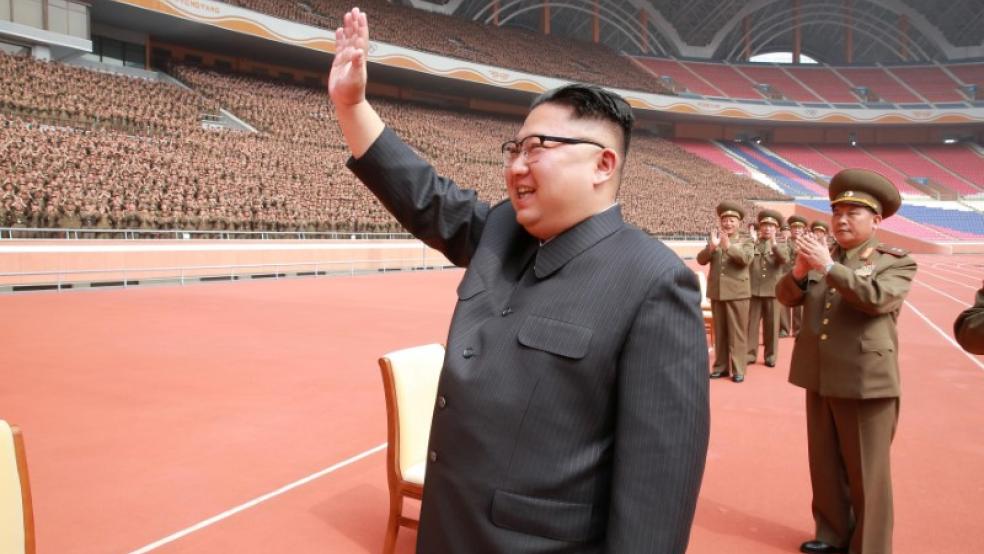North Korea stunned the world on Wednesday when it announced that it had successfully detonated a hydrogen bomb. If true, this means the country has taken a huge step forward in its nuclear capabilities.
The claim generated considerable skepticism over whether the reclusive nation actually has the technical ability to build this type of nuclear weapon.
Related: North Korea Has a Meth Problem, an Unstable Leader—and Nukes
But even if North Korea did indeed detonate a hydrogen bomb, there’s little reason to panic, at least not yet. Western experts say that North Korea lacks the missile technology required to deliver the weapon over long distances.
Since North Korea’s first nuclear test in 2006, the U.N. Security Council has imposed sanctions on the country, attempted to block access to high-tech equipment, and pressured it to stop developing its nuclear capabilities. It appears that these tactics have failed to work. The Security Council will hold an emergency meeting on Wednesday to discuss the incident.
While world powers are considering how to respond to North Korea’s provocative and defiant move, here’s a primer on hydrogen bombs and the situation in the Korean peninsula:
What is a hydrogen bomb?
Otherwise known as a thermonuclear bomb or H-bomb, a hydrogen bomb is the most powerful kind of nuclear weapon. Fueled by the nuclear fusion of hydrogen isotopes under extremely high temperatures to form helium, the weapon is much more destructive than an atomic bomb. An H-bomb is powered by the energy released from the combination of two light atomic nuclei, while an atomic bomb uses the energy released from a nuclear fission, in which a heavy atomic nucleus splits.
How powerful is a hydrogen bomb?
The atomic bombs the U.S. dropped over Hiroshima and Nagasaki in 1945 had expolosive yields of 15 and 20 kilotons, respectively, meaning they gave off as much energy as that many thousands of tons of TNT. These bombs killed more than 200,000 people. By comparison, the hydrogen bomb that the U.S. tested in 1954 at the Bikini Atoll in the Marshall Islands had an explosive yield of 15 megatons, making it 1,000 times as powerful as the atomic bombs dropped on Japan.
The most powerful nuclear weapon ever detonated was the 1961 Tzar Bomba. The Soviet hydrogen bomb had an explosive yield of 50 megatons, or the power of about 3,800 Hiroshima bombs detonated simultaneously.
What countries have hydrogen bombs?
The countries that are known to possess H-bombs are Britain, China, France, Russia and the U.S. It’s unclear if the four other countries that have atomic bombs -- India, Israel, Pakistan and North Korea -- also have hydrogen bombs.
Related: How Kate Upton’s Cleavage Could Destroy North Korea
Are other countries testing hydrogen bombs?
Most countries aren’t. As of March 2015, 164 states have ratified the Comprehensive Nuclear-Test-Ban Treaty and another 19 have signed but not ratified it. The treaty calls for a ban on all nuclear explosions in all environments. Although the treaty was adopted by the United Nations in 1996, it is not officially in effect because eight countries that possess nuclear power reactors or research reactors haven’t ratified it. North Korea is one of those eight countries, along with China, Egypt, Iran, Israel, the United States, India and Pakistan.
North Korea has also not signed the Limited Test Ban Treaty, which forbids all test explosions of nuclear weapons except underground. The Treaty was signed by the governments of the Soviet Union, the U.S. and the United Kingdom in 1963 and was then opened for signature by other countries. China and France have also not signed the treaty, though most countries have signed and ratified it.
Since 1996, only three countries have tested nuclear weapons. India and Pakistan have each carried out two tests and North Korea has conducted four.
Why are experts skeptical that this really was a hydrogen bomb?
Many experts, including those in the South Korean military, are saying that the blast wasn’t large enough to be a hydrogen bomb, or even a failed one. South Korean lawmakers told reporters that the bomb that North Korea tested on Wednesday had a yield of about six kilotons – about the same size as the country’s 2013 atomic test. A successful hydrogen test would have a yield of hundreds of kilotons, while a failed test would have a yield of tens of kilotons.
In addition, the tremor on Wednesday was recorded at a magnitude of 5.1, according to the U.S. Geological Survey. The 2013 nuclear test had roughly the same magnitude.
How can North Korea’s claim be verified?
We may never know for sure if North Korea detonated a hydrogen bomb, but governments are already taking steps to learn more about the test. The U.S. dispatched its WC-135 “sniffer plane,” while Japan sent three aircraft to detect any radioactive gases from around the site. It might take some time before any information is found because gases can sometimes leak for up to several weeks following a test.
How many times has North Korea conducted nuclear tests?
North Korea detonated nuclear weapons on Oct. 9, 2006; May 25, 2009; and Feb. 12, 2013. The nuclear test on Jan. 6, 2016 brings the total to four.
Related: North Korea Warns the United States: Our Nukes Are Ready
What was the global reaction to North Korea’s claim?
North Korea’s main ally, China, responded by saying that it “firmly opposes” the test and that it was conducted “irrespective of the international community’s opposition.”
The U.S. is waiting to respond until the test is confirmed, but says that it stands firmly with its allies and will answer to any provocations by North Korea.
The U.N. Security Council called for an emergency meeting to devise an international response and is currently drafting further sanctions on North Korea.
Russia, France, Japan and Britain all condemned the action.
Why did North Korea launch a nuclear test?
The country’s motive is unclear and many theories are circulating. A senior analyst at a South Korean think tank, Cheong Seong-chang, told The Wall Street Journal that North Korea wants to be recognized internationally as a nuclear power, like Pakistan. The country is also hoping that the test will lead to some sort of negotiation with the U.S., perhaps over ending the American military alliance with South Korea, something that was mentioned specifically in the announcement of the test.
North Korea might have also been looking for more attention in a world occupied with events in the Middle East. Critics are already saying that Obama has been too soft on the threat from North Korea and that it’s time to attend to the problems occurring in Asia.





